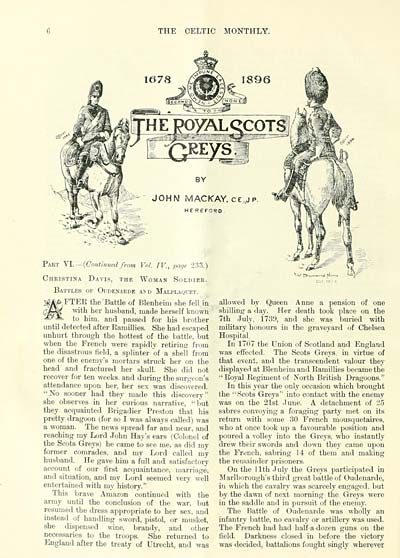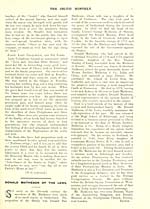Blair Collection > Celtic monthly > Volume 5, 1897
(20)
Download files
Complete book:
Individual page:
Thumbnail gallery: Grid view | List view

THE CELTIC MONTHLY.
Part \l.— (Continued from VnJ. IV., pm/e -23.3.)
Christina Davis, the Woman Soldier.
Battles of Ohdenarde a>d Malplaquet.
^Jt^rTER the Battle of Blenheim she fell in
(^^& with her husband, made herself known
=*y^ to him. and passed for his brother
imtil detected after Eamillies. She had escaped
unhurt through the hottest of the battle, but
when the French were rapidly retiring from
the disastrous field, a splinter 'of a shell from
one of the enemy's mortars struck her on the
head and fractured her skull. She did not
recover for ten weeks, and during the surgeon's
attendance upon her, her sex was discovered.
"No sooner had they made this discovery"
she observes in her curious narrative, "but
they acquainted Brigadier Preston that his
pretty dragoon (for so I was always called) was
a woman. The news spread far and near, and
reaching my Lord John Hay's ears (Colonel of
the Scots Greys) he came to see me, as did my
former comrades, and my Lord called my
husband. He gave him a full and satisfactory
account of our lirst acquaintance, marriage,
and situation, and my Lord seemed very well
entertained with my history."
This brave Amazon continued with the
army until the conclusion of the war, but
resumed the dress appropriate to her sex, and
instead of handling sword, pistol, or musket,
she dispensed wine, brandy, and other
necessaries to the troops. She returned to
England after the treaty of Utrecht, and was
allowed by Queen Anne a pension of one
shilling a day. Her death took place on the
7th July, 173!1, and she was buried with
military honours in the graveyard of Chelsea
Hospital.
In 1707 the Union of Scotland and England
was effected. The Scots Greys, in virtue of
that event, and the transcendent valour they
displayed at Blenheim and Eamillies became the
"Royal Regiment of North British Dragoons."
In this year the only occasion which brought
the "Scots Greys" into contact with the enemy
was on the 21st .June. A detachment of i'5
sabres convoying a foraging party met on its
return with some 30 French mousquetaires,
who at once took up a favourable position and
poured a volley into the Greys, who instantly
drew their swords and down they came upon
the French, sabring 14 of them and making
the remainder prisoners.
On the 11th July the Greys participated in
Marlborough's third great battle of Oudenarde,
in which the cavalry was scarcely engaged, but
by the dawn of next morning the Greys were
in the saddle and in pursuit of the enemy.
The Battle of Oudenarde was wholly an
infantry battle, no cavalry or artillery was used.
The French had had half-a-dozen guns on the
field. Darkness closed in before the victory
was decided, battalions fought singly wherever
Part \l.— (Continued from VnJ. IV., pm/e -23.3.)
Christina Davis, the Woman Soldier.
Battles of Ohdenarde a>d Malplaquet.
^Jt^rTER the Battle of Blenheim she fell in
(^^& with her husband, made herself known
=*y^ to him. and passed for his brother
imtil detected after Eamillies. She had escaped
unhurt through the hottest of the battle, but
when the French were rapidly retiring from
the disastrous field, a splinter 'of a shell from
one of the enemy's mortars struck her on the
head and fractured her skull. She did not
recover for ten weeks, and during the surgeon's
attendance upon her, her sex was discovered.
"No sooner had they made this discovery"
she observes in her curious narrative, "but
they acquainted Brigadier Preston that his
pretty dragoon (for so I was always called) was
a woman. The news spread far and near, and
reaching my Lord John Hay's ears (Colonel of
the Scots Greys) he came to see me, as did my
former comrades, and my Lord called my
husband. He gave him a full and satisfactory
account of our lirst acquaintance, marriage,
and situation, and my Lord seemed very well
entertained with my history."
This brave Amazon continued with the
army until the conclusion of the war, but
resumed the dress appropriate to her sex, and
instead of handling sword, pistol, or musket,
she dispensed wine, brandy, and other
necessaries to the troops. She returned to
England after the treaty of Utrecht, and was
allowed by Queen Anne a pension of one
shilling a day. Her death took place on the
7th July, 173!1, and she was buried with
military honours in the graveyard of Chelsea
Hospital.
In 1707 the Union of Scotland and England
was effected. The Scots Greys, in virtue of
that event, and the transcendent valour they
displayed at Blenheim and Eamillies became the
"Royal Regiment of North British Dragoons."
In this year the only occasion which brought
the "Scots Greys" into contact with the enemy
was on the 21st .June. A detachment of i'5
sabres convoying a foraging party met on its
return with some 30 French mousquetaires,
who at once took up a favourable position and
poured a volley into the Greys, who instantly
drew their swords and down they came upon
the French, sabring 14 of them and making
the remainder prisoners.
On the 11th July the Greys participated in
Marlborough's third great battle of Oudenarde,
in which the cavalry was scarcely engaged, but
by the dawn of next morning the Greys were
in the saddle and in pursuit of the enemy.
The Battle of Oudenarde was wholly an
infantry battle, no cavalry or artillery was used.
The French had had half-a-dozen guns on the
field. Darkness closed in before the victory
was decided, battalions fought singly wherever
Set display mode to: Large image | Transcription
Images and transcriptions on this page, including medium image downloads, may be used under the Creative Commons Attribution 4.0 International Licence unless otherwise stated. ![]()
| Early Gaelic Book Collections > Blair Collection > Celtic monthly > Volume 5, 1897 > (20) |
|---|
| Permanent URL | https://digital.nls.uk/75851214 |
|---|
| Shelfmark | Blair.57 |
|---|---|
| Additional NLS resources: | |
| Attribution and copyright: |
|
| Description | A selection of books from a collection of more than 500 titles, mostly on religious and literary topics. Also includes some material dealing with other Celtic languages and societies. Collection created towards the end of the 19th century by Lady Evelyn Stewart Murray. |
|---|
| Description | Selected items from five 'Special and Named Printed Collections'. Includes books in Gaelic and other Celtic languages, works about the Gaels, their languages, literature, culture and history. |
|---|

